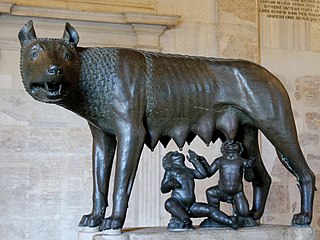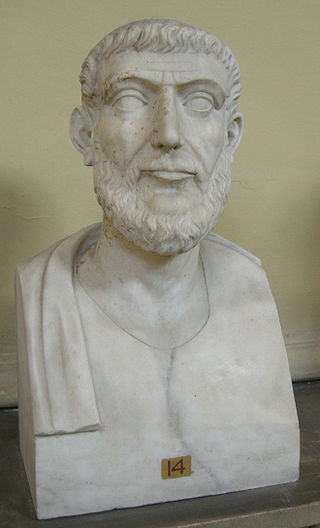Related Research Articles
Latin literature includes the essays, histories, poems, plays, and other writings written in the Latin language. The beginning of formal Latin literature dates to 240 BC, when the first stage play in Latin was performed in Rome. Latin literature would flourish for the next six centuries. The classical era of Latin literature can be roughly divided into the following periods: Early Latin literature, The Golden Age, The Imperial Period and Late Antiquity.

The tale of the founding of Rome is recounted in traditional stories handed down by the ancient Romans themselves as the earliest history of their city in terms of legend and myth. The most familiar of these myths, and perhaps the most famous of all Roman myths, is the story of Romulus and Remus, twins who were suckled by a she-wolf as infants. Another account, set earlier in time, claims that the Roman people are descended from Trojan War hero Aeneas, who escaped to Italy after the war, and whose son, Iulus, was the ancestor of the family of Julius Caesar. The archaeological evidence of human occupation of the area of modern-day Rome dates from about 14,000 years ago.

In Roman mythology, Romulus and Remus are twin brothers whose story tells of the events that led to the founding of the city of Rome and the Roman Kingdom by Romulus, following his fratricide of Remus. The image of a she-wolf suckling the twins in their infancy has been a symbol of the city of Rome and the ancient Romans since at least the 3rd century BC. Although the tale takes place before the founding of Rome around 750 BC, the earliest known written account of the myth is from the late 3rd century BC. Possible historical bases for the story, and interpretations of its various local variants, are subjects of ongoing debate.
Lucius Accius, or Lucius Attius, was a Roman tragic poet and literary scholar. Accius was born in 170 BC at Pisaurum, a town founded in the Ager Gallicus in 184 BC. He was the son of a freedman and a freedwoman, probably from Rome.

Appius Claudius Caecus was a statesman and writer from the Roman Republic. The first Roman public figure whose life can be traced with some historical certainty, Caecus was responsible for the building of Rome's first road and first aqueduct, as well as instigating controversial popular-minded reforms. He is also credited with the authorship of a juristic treatise, a collection of moral essays, and several poems, making him one of Rome's earliest literary figures.
Quintus Fabius Pictor was the earliest known Roman historian. His history, written in Greek and now mostly lost besides some surviving fragments, was highly influential on ancient writers and certainly participated in introducing Greek historiographical methods to the Roman world. However, the work was highly partisan towards Rome, blaming the Second Punic War on Carthage and idealizing the Roman Republic as a well-ordered state loyal to its allies. Fabius probably served as praetor, was a member of the Senate, and participated in a delegation sent to the oracle at Delphi in 216 BC. Some scholars consider him one of the earliest annalists, although this conclusion has been criticized.

Pseudepigrapha are falsely attributed works, texts whose claimed author is not the true author, or a work whose real author attributed it to a figure of the past, called generically a pseudo-author and specifically Pseudo-Name, prefixing the author's name with the particle "pseudo-".

Maia, in ancient Greek religion and mythology, is one of the Pleiades and the mother of Hermes, one of the major Greek gods, by Zeus, the king of Olympus.
Publius Nigidius Figulus was a scholar of the Late Roman Republic and one of the praetors for 58 BC. He was a friend of Cicero, to whom he gave his support at the time of the Catilinarian conspiracy. Nigidius sided with the Optimates in the civil war between Julius Caesar and Pompeius Magnus.
Annalists, were a class of writers on Roman history, the period of whose literary activity lasted from the time of the Second Punic War to that of Sulla. They wrote the history of Rome from the earliest times down to their own days, the events of which were treated in much greater detail. Annalists were different from historians, in that an annalist was more likely to just record events for reference purposes, rather than offering their own opinions of events. There is, however, some overlap between the two categories and sometimes annalist is used to refer to both styles of writing from the Roman era.
Ancient literature comprises religious and scientific documents, tales, poetry and plays, royal edicts and declarations, and other forms of writing that were recorded on a variety of media, including stone, clay tablets, papyri, palm leaves, and metal. Before the spread of writing, oral literature did not always survive well, but some texts and fragments have persisted. One can conclude that an unknown number of written works too have likely not survived the ravages of time and are therefore lost.

The Fasti, sometimes translated as The Book of Days or On the Roman Calendar, is a six-book Latin poem written by the Roman poet Ovid and published in AD 8. Ovid is believed to have left the Fasti incomplete when he was exiled to Tomis by the emperor Augustus in 8 AD. Written in elegiac couplets and drawing on conventions of Greek and Latin didactic poetry, the Fasti is structured as a series of eye-witness reports and interviews by the first-person vates with Roman deities, who explain the origins of Roman holidays and associated customs—often with multiple aetiologies. The poem is a significant, and in some cases unique, source of fact in studies of religion in ancient Rome; and the influential anthropologist and ritualist J.G. Frazer translated and annotated the work for the Loeb Classical Library series. Each book covers one month, January through June, of the Roman calendar, and was written several years after Julius Caesar replaced the old system of Roman time-keeping with what would come to be known as the Julian calendar.
The gens Terentia was a plebeian family at ancient Rome. Dionysius mentions a Gaius Terentius Arsa, tribune of the plebs in 462 BC, but Livy calls him Terentilius, and from inscriptions this would seem to be a separate gens. No other Terentii appear in history until the time of the Second Punic War. Gaius Terentius Varro, one of the Roman commanders at the Battle of Cannae in 216 BC, was the first to hold the consulship. Members of this family are found as late as the third century AD.
Roman historiography stretches back to at least the 3rd century BC and was indebted to earlier Greek historiography. The Romans relied on previous models in the Greek tradition such as the works of Herodotus and Thucydides. Roman historiographical forms are usually different from their Greek counterparts, however, and often emphasize Roman concerns. The Roman style of history was based on the way that the Annals of the Pontifex Maximus, or the Annales Maximi, were recorded. The Annales Maximi include a wide array of information, including religious documents, names of consuls, deaths of priests, and various disasters throughout history. Also part of the Annales Maximi are the White Tablets, or the "Tabulae Albatae", which consist of information on the origin of the Roman Republic.
Lucius Cincius Alimentus was a celebrated Roman annalist, jurist, and provincial official. He is principally remembered as one of the founders of Roman historiography, although his Annals has been lost and is only known from fragments in other works.
The gens Cincia was a plebeian family at Rome. The first member of the gens to achieve prominence was Lucius Cincius Alimentus, who was elected praetor in 209 BC.

Roman mythology is the body of myths of ancient Rome as represented in the literature and visual arts of the Romans. One of a wide variety of genres of Roman folklore, Roman mythology may also refer to the modern study of these representations, and to the subject matter as represented in the literature and art of other cultures in any period. Roman mythology draws from the mythology of the Italic peoples and ultimately from Proto-Indo-European mythology.

Gnaeus Gellius was a Roman historian. Very little is known about his life and work, which has only survived in scattered fragments. He continued the historical tradition set by Fabius Pictor of writing a year-by-year history of Rome from mythological times to his day. However, with about a hundred books, Gellius' Annales were massively more developed than the other Roman annalists, and was only surpassed by Livy's gigantic History of Rome.

In ancient Roman religion and myth, Hercules was venerated as a divinized hero and incorporated into the legends of Rome's founding. The Romans adapted Greek myths and the iconography of Heracles into their own literature and art, but the hero developed distinctly Roman characteristics. Some Greek sources as early as the 6th and 5th century BC gave Heracles Roman connections during his famous labors.

The overthrow of the Roman monarchy was an event in ancient Rome that took place between the 6th and 5th centuries BC where a political revolution replaced the then-existing Roman monarchy under Lucius Tarquinius Superbus with a republic. The details of the event were largely forgotten by the Romans a few centuries later; later Roman historians invented a narrative of the events, traditionally dated to c. 509 BC, but this narrative is largely believed to be fictitious by modern scholars.
References
- ↑ T.P. Wiseman, Clio's Cosmetics (Bristol Phoenix Press, 2003, originally published 1979 by Leicester University Press), p. 45; but this is based on a reference in Macrobius (Saturnalia 1.12.12) to a L. Cincius (Cingius in some editions) who wrote a book De fastis also sometimes attributed to the annalist Lucius Cincius Alimentus, particularly since John Lydus gives the title in Greek and Alimentus wrote in Greek.
- ↑ Gian Biagio Conte, Latin Literature: A History (Johns Hopkins University Press, 1994, originally published 1987 in Italian), p. 70.
- ↑ In his classic history of Latin literature, Teuffel distinguishes the two, as in the 1891 English translation. So too Wiseman, Clio's Cosmetics, p. 15, note 39.
- ↑ J.G.F. Powell, "Dialogues and Treatises," in A Companion to Latin Literature, edited by Stephen Harrison (Blackwell, 2005), p. 229 online.
- ↑ Wiseman, Clio's Cosmetics, pp. 45–46.